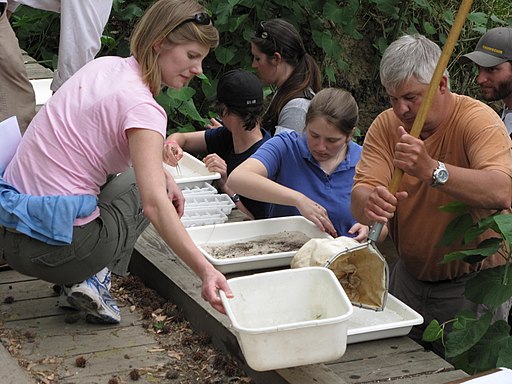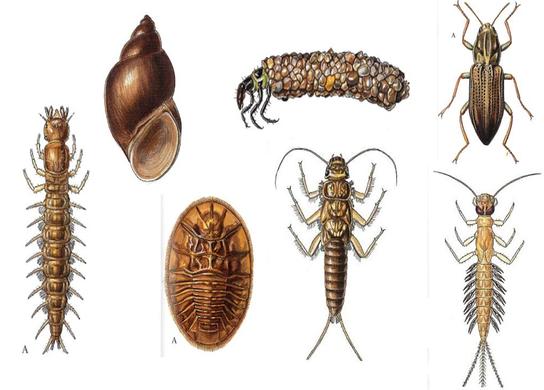Discover the underwater world of macroinvertebrates by seeing them up close and learning how they help indicate stream health. NHSM volunteers will show participants how to catch and identify macroinvertebrates. Suitable for ages 6 and up. All equipment will be provided. Dress for the water and prepare to get wet and muddy.
Macroinvertebrates are organisms that are large (macro) enough to be seen with the naked eye and lack a backbone (invertebrate). They inhabit all types of running waters, from fast-flowing mountain streams to slow-moving muddy rivers. Examples of aquatic macroinvertebrates include insects (in their adult, larval, or nymph forms), mollusks, crustaceans, and worms (Viklund, 2011). Most of them live part or most of their life cycle attached to submerged rocks, logs, and vegetation or else in soft sediment. Aquatic macroinvertebrates serve multiple functions in freshwater ecosystems. In addition to their role as primary consumers processing live organic material, they also serve as detritivores, consuming decomposing organic matter; predators, consuming macroinvertebrates and other small organisms; and prey, serving as food for fish, amphibians, reptiles, aquatic birds, and mammals.
- Location – Gwynns Falls/Leakin Park, Baltimore (exact meeting location will be provided upon registration)
- Free, but please RSVP for planning purposes. Donations are accepted and much appreciated.
Stream Days will take place on the fourth Sundays through summer- May 28, June 25, July 23, August 27, and September 24. Come see how the stream changes through the seasons. Will happen rain or shine. Canceled for extreme weather with rain date the next Sunday.
ABOUT Gwynns Falls/Leakin Park is one of the largest woodland parks in an East Coast city, constituting a contiguous area of 1000 acres (400 hectares), 84% of which is forest. Envisioned as a “stream valley park” to protect Baltimore’s watersheds from overdevelopment and to preserve their natural habitats, Gwynns Falls/Leakin Park today offers a rare opportunity for the public to explore a diverse natural environment characterized by stream valleys, ridge tops, and meadows; enjoy opportunities for active recreation; and experience historic structures from an earlier era.
Gwynns Falls/Leakin Park, designated as part of the Baltimore National Heritage Area, is managed and maintained by the Baltimore City Department of Recreation and Parks, assisted and supported by volunteers of the Friends of Gwynns Falls/Leakin Park (FoGFLP).




